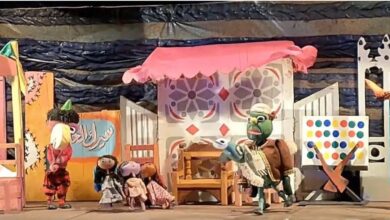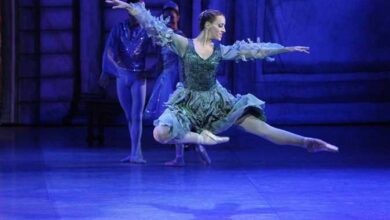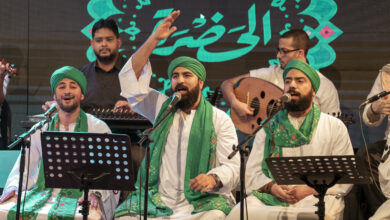An evening of Tchaikovsky was a fitting opening to the 52nd season of the Cairo Symphony Orchestra (CSO) on Saturday, the first since the departure of Hosni Mubarak earlier this year.
Ushered in from a warm evening breeze, this reviewer had no idea of what he was about to listen to – such is the current state of play at the Cairo Opera House.
First, there was no information on the venue’s website as to what the evening program might be. Their marketing skills seem to have seen a decline, and audience members had the Japanese Embassy to thank for publicizing the orchestra’s seasonal debut.
Although the hall was only at minimal capacity, there were not enough programs to go around. Audiences only learned more when the Japanese ambassador gave a short speech to congratulate the Egyptian people on their revolution and thank Egypt for its solidarity with Japan following the devastating earthquake and subsequent tsunami in March.
At the invitation of the Egyptian government, Tokyo’s prestigious Hirofumi Yoshida, currently musical director of the Mantua Opera in Italy, brought the orchestra out of hibernation in a performance of triumphant masterworks by the renowned Russian composer.
As the players arrived on stage, a rather discouraging trickle of applause reminded one of the somewhat depleted audience. However, the small figure of Yoshida positively leapt onto the stage with gusto and wasted no time in launching into the crowd-pleasing “1812 Overture.” Such was the vigor of the conductor that during the piece's quiet moments an unfortunate stomping resonated throughout the hall. Perhaps a new conducting platform should be suggested for the venue, so as not to upset one of the leading conductors of his generation.
The “1812” resonantly embraces the spirit of overcoming oppression and triumphing. Four cellos and two violas play a Slavic hymn in a stunning opening that turns to a theme of distress. The motif of "La Marseillaise" – the French national anthem – is introduced by the French horns, narrating the French capture of Moscow in September 1812. However, the Russians on a third attempt take back the city, culminating in an explosive and triumphant finish.
Yoshida then led the players into the "Capriccio Italien," Tchaikovsky’s Op. 45, one of his most effective and indulgent works. The orchestra more or less kept it together, but did not seem to pander to the inexhaustible Yoshida. Eventually, the players responded with a bit of motivation, but it was not until the performance of the Fifth Symphony following the intermission that it finally came alive. Although originally received as crude and disappointing at its premiere in the Saint Petersburg winter of 1888, the symphony is now a permanent favorite with audiences. In 1889 a reviewer in New York called it “dire and bloody," but few would have agreed in the face of the rapturous applause at the Cairo Opera House on Saturday evening.
The French horns suffered somewhat – at one particularly unfortunate moment, a player dropped his mouthpiece and watched aghast as it slipped away from him, saliva dribbling onto the stage. The general aura of the evening was one of lamentable disorganization. A source at the Cairo Symphony Orchestra confirmed that rehearsals had only begun on Tuesday of last week and that its general meeting had been canceled. On top of this, the orchestra lacks a permanent resident conductor and, as is the case with the Opera House, has an inadequate website.
Nonetheless, the hastily organized ensemble pulled off a pleasant performance under the inspirational direction of Yoshida. Hiccups along the way may abound, but the orchestra has a promising season ahead of it. They will next be performing works by Dvorak, Szymanowski and Kodaly in the Opera House Main Hall next Saturday, 24 September at 8 pm.
A highlight this week at the Cairo Opera House will be a concert performed by the English Chamber Orchestra in aid of Save the Children. The evening will include works by J.S. Bach, Mozart and two contemporary Arab composers, Halim el-Dabh and Gamal Abdel Rahim. The climax of the evening, however, should be found in “Al-Hedeiya," conductor David Heath’s “Gift” to the Egyptian people. This will be the first opportunity for Cairenes to experience Heath’s piano concerto that received wide acclaim from London’s music critics. It would be foolish to miss the experience of hearing one of the world’s most accomplished and recorded orchestras.
The English Chamber Orchestra performs under the direction of soloist Stephanie Gonley at the Cairo Opera House, Main Hall – Monday 19 September, 8 pm.




